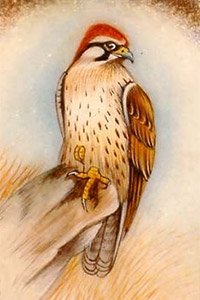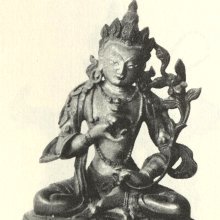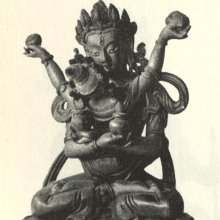Candradeva: 7 definitions
Introduction:
Candradeva means something in Buddhism, Pali, Hinduism, Sanskrit. If you want to know the exact meaning, history, etymology or English translation of this term then check out the descriptions on this page. Add your comment or reference to a book if you want to contribute to this summary article.
Alternative spellings of this word include Chandradeva.
Images (photo gallery)
In Hinduism
Purana and Itihasa (epic history)
Source: archive.org: Nilamata Purana: a cultural and literary studyCandradeva (चन्द्रदेव) is the name of a Brāhmaṇa that learned instructions from Nāga king Nīla according to the Nīlamata-purāṇa .—Troubled by the Piśācas, Candradeva approached the Nāga king Nīla who was served by the Piśāca chief Nikumbha and various Nāgas. Candradeva praised Nīla and asked that Kaśmīra might thenceforth be inhabited by men without the fear of emigration. Nīla complied with this request on the condition that men should follow his instructions revealed to him by Keśava. Candradeva lived for six months in the palace of Nīla and learnt all the rites and ceremonies prescribed by Nīla.

The Purana (पुराण, purāṇas) refers to Sanskrit literature preserving ancient India’s vast cultural history, including historical legends, religious ceremonies, various arts and sciences. The eighteen mahapuranas total over 400,000 shlokas (metrical couplets) and date to at least several centuries BCE.
Shyanika-shastra (the science of Hawking and Hunting)
Source: archive.org: Syainika Sastra of Rudradeva with English TranslationCandradeva (चन्द्रदेव) is another name for Rudradeva: the author of the Śyainika-śāstra: a Sanskrit treatise dealing with the divisions and benefits of hunting.—The śyainikaśāstra is a book on hawking in Sanskrit by Rudradeva (or Candradeva or Rudracandra Deva as the MS. C calls him), a Rājā of Kūrmācala or Kumaon. The Royal author is systematic in his treatment of the subject. Nowhere does he indulge in theories. His book is thoroughly practical.

Shyanika-shastra (श्यैनिकशास्त्र, śyainikaśāstra) deals with ancient Indian skill of hawking/falconry (one of the ways of hunting) which were laid down in a systematic manner in various Sanskrit treatises. It also explains the philosophy behind how the pleasures derived from sense-experience could lead the way to liberation.
In Buddhism
Tibetan Buddhism (Vajrayana or tantric Buddhism)
Source: archive.org: The Indian Buddhist IconographyCandradeva (चन्द्रदेव) or Candra refers to the Moon-God and represents one of the nine planets (Navagraha), commonly depicted in Buddhist Iconography, and mentioned in the 11th-century Niṣpannayogāvalī of Mahāpaṇḍita Abhayākara.—His colour is white; his Symbols are the discs of the moon; his Vehicle is the swan; he has two arms.
Candra (Candradeva) is described in the Niṣpannayogāvalī (dharmadhātuvāgīśvara-maṇḍala) as follows:—
“Candra rides on a Swan, is white in colour and holds in his right and left hands the discs of the Moon on lotuses”.
[As Candradeva this planet is popular in the Chinese collection].

Tibetan Buddhism includes schools such as Nyingma, Kadampa, Kagyu and Gelug. Their primary canon of literature is divided in two broad categories: The Kangyur, which consists of Buddha’s words, and the Tengyur, which includes commentaries from various sources. Esotericism and tantra techniques (vajrayāna) are collected indepently.
Languages of India and abroad
Sanskrit dictionary
Source: Cologne Digital Sanskrit Dictionaries: Aufrecht Catalogus Catalogorum1) Candradeva (चन्द्रदेव) as mentioned in Aufrecht’s Catalogus Catalogorum:—poet. Śp. p. 28.
2) Candradeva (चन्द्रदेव):—Holikotsava.
Source: Cologne Digital Sanskrit Dictionaries: Monier-Williams Sanskrit-English Dictionary1) Candradeva (चन्द्रदेव):—[=candra-deva] [from candra > cand] m. Name of a warrior, [Mahābhārata viii, 1078 and 1086]
2) [v.s. ...] of a Brāhman (of Kāśyapa’s family), [Rājataraṅgiṇī i, 182 ff.]
3) [v.s. ...] of a poet, [Śārṅgadhara-paddhati]
[Sanskrit to German]
Sanskrit, also spelled संस्कृतम् (saṃskṛtam), is an ancient language of India commonly seen as the grandmother of the Indo-European language family (even English!). Closely allied with Prakrit and Pali, Sanskrit is more exhaustive in both grammar and terms and has the most extensive collection of literature in the world, greatly surpassing its sister-languages Greek and Latin.
See also (Relevant definitions)
Partial matches: Deva, Candra, Teva.
Ends with: Govindacandradeva, Lakshmanacandradeva, Magacandradeva, Rudracandradeva.
Full-text (+1351): Rudracandradeva, Krishnacandradevasharman, Holikotsava, Candra, Vasantaraja bhatta, Pakshakakalika, Culanka, Prithaglakshana, Anusara, Marga, Pada, Padamarga, Sukumara, Uparodhana, Ashvasadin, Vishama, Javadhika, Sukshmakaya, Suna, Cakravaka.
Relevant text
Search found 8 books and stories containing Candradeva, Candra-deva; (plurals include: Candradevas, devas). You can also click to the full overview containing English textual excerpts. Below are direct links for the most relevant articles:
Mahabharata (English) (by Kisari Mohan Ganguli)
The Devi Bhagavata Purana (by Swami Vijñanananda)
Chapter 11 - On the birth of Budha < [Book 1]
Chapter 12 - On the birth of Pururavā < [Book 1]
The Nilamata Purana (by Dr. Ved Kumari)
The Skanda Purana (by G. V. Tagare)
Chapter 106 - Greatness of the Vanished Tīrthas < [Section 1 - Tīrtha-māhātmya]
Puranic encyclopaedia (by Vettam Mani)
A Dictionary Of Chinese Buddhist Terms (by William Edward Soothill)

